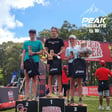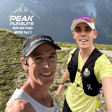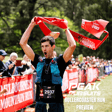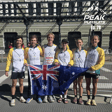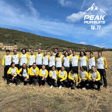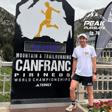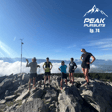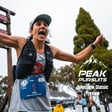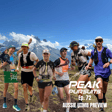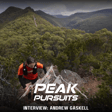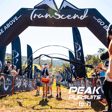Blake Turner's Late Start and Achievements in Trail Running
00:00:15
Speaker
Hello and welcome to the Peak Pursuits podcast. My name is James Sieber and today I'm joined by Blake Turner who is going to be continuing our World Mountain and Trail Running Championships team talks as he prepares for the short trail champs over in Camp Frank in only a matter of weeks now.
00:00:31
Speaker
Blake is no stranger to the world podium, having podiums both at the World Sky Running Champs and a third at Asia Pacific just last year. Proceeding these impressive results, Blake actually got into the sport at quite a late age and from more of an adventure driven direction rather than performance.
00:00:50
Speaker
After exploring mountains worldwide, he eventually found a love for the competitive side, specifically the technicality, and that has led all the way to now his third team for Australia and his first team for the World Mountain Trail Championships. This is a really interesting chat with Blake we dive into a lot of fascinating subjects including his years-long battle with injuries and the causes and the way out that he has now found himself into having one of his most successful careers in running in 2024 and now onto this team with that let's get to the chat with Blake
Why Did Blake Turner Enter the Sky Running World Series?
00:01:23
Speaker
Blake welcome back onto the people's podcast how are you going today? Hey mate, yeah, really good. ah Good to finally get to speak to you. Very, very keen. I was just listening back to the episode you came on with Sim and i think it was Vlad on the main show after the two Sky Races over in Asia.
00:01:40
Speaker
ah First of all, it reminded me quite how crazy those races were, but definitely keen to hear a lot more about but you and your story and obviously this build up to to worlds that we're going chat about today.
00:01:53
Speaker
Yeah, yeah, feels like an eternity now since those Sky Races, how fun they were, but just the stepping stone they were at the time to to this main event now, which it seems to be quite appropriate stepping stone now.
00:02:06
Speaker
Yeah, um I might actually, since we're on it, start there. When you signed up for those, did you do that because you were you knew that you were going to be applying for Worlds and that if you got in, this was going to be, the Worlds was going to be a pretty technical event?
00:02:21
Speaker
ah Partly. So obviously we didn't know about selection for Worlds. we We didn't know when the team was going to be announced. At the start of the year, I'm like, okay, let's plan the year.
00:02:32
Speaker
um And obviously, it's not a certainty to get selected. So I so i i chose to apply to go for the Skyrunning World Series, ah which was minimum four races, and they were on the Asia region, and then the final being in Europe.
00:02:48
Speaker
So if I didn't make the Worlds, then i I would still have my lovely holiday in Europe at some point. ah ha So, and also, yeah, the technicality, if I was lucky enough to make it in, it was definitely going to hold me um in good stead. I think from from hearing what this course might have been, um that there's much practice on that terrain.
00:03:11
Speaker
I think a sky high running style race well was in the forefront of my mind, yeah.
From Adventure to Competition: Blake's Running Journey
00:03:15
Speaker
Okay it's interesting I'm always curious how much foresight people are putting into the planning their season and all the possible eventualities that could come especially when you don't know what is going to happen even when you're going to be able to apply when the team will get announced etc so all very interesting when i said I was listening to that podcast you went into great detail of that but I realized that I really don't know much about you and your background and coming back through things like I've seen you've been racing for quite a while there was a break sort of 2019 2022 and on Instagram there's these trips to Patagonia and Antarctica and so feel like there's a really interesting backstory to you as a person kind of then into into running if you happy to kind of go into that and share a bit more about yeah who who Blake is
00:04:03
Speaker
Yeah, for sure. It's not super interesting, but I suppose ah suppose it kicked off when I was about 25, which 2015. I kind twenty fifteen um ah kind of half left my party side behind um and decided it's time to start living um and then just started to look at things that really interested me and i was really drawn to kind of the the mountains uh or mountainous regions um so yeah i finally i finally moved out of home um and i i signed up for a
00:04:40
Speaker
I can't remember what it's called now, ah and the Everest Trail Race, which is a race from the Tenzing Hillary Everest Race or what it was, yeah, which is from Everest Base Camp, 42K, you run down um and you hike up and it was pretty it was pretty interesting to me.
00:05:01
Speaker
um And that was what kicked it off. But back in, when I started, i kind of, uh, used running as a way to get me to where I wanted to go, ah whatever location I was. So I would generally, before that race, I went and I climbed a 6,000 meter mountain.
00:05:20
Speaker
Um, I did a 12 day. trek with just me and a guide and two porters. And then I went to the Chitwan National Park. And then after that, I hiked the base camp and ran there, the marathon.
00:05:33
Speaker
So it wasn't really the, yeah the um ah race wasn't my first and foremost goal. It was the the way to get me there.
00:05:43
Speaker
um And then like climbing was kind of on the forefront of my mind too. I kind of really wanted to go. the alpinism kind of route as well, um which I started to get into a little bit, but not as much.
00:05:57
Speaker
um And it went from there. And then I just, I'm like, do I want to go next? You know, so South America, Argentina, Patagonia, I ran a stage race um in Patagonia, the 250K seven-day stage race, ah self-supported. um And then i I tacked on like a two-week trip.
00:06:17
Speaker
I just road trip down Patagonia. um and then got on a trip to Antarctica and another bucket list item, you know. So the races were, ah they weren't, I wasn't like going for the pinnacle performance. I was there to compete with myself um and I would always do relatively well but not not blow it out of the park and not fall to pieces.
Lifestyle Shift: Partying to Running Commitment
00:06:40
Speaker
um And then I would just be like, right, now the holiday begins.
00:06:46
Speaker
and But then it kind of slowly transitioned where the results were kind of ah weighing more into it and that's when the training started to get a little bit more serious.
00:06:58
Speaker
That's really interesting. i wasn't sure when I first saw the trips if it was anything to do with your work, but it's just purely adventure and exploration. nu and It couldn't be anything further to do with my work. i i'm i work I'm a builder. I'm a carpenter by trade and I'm a supervisor now in a commercial construction company. so yeah When you said before that you're 25, left we said mostly your party side to behind, what did your lifestyle used to look like?
00:07:26
Speaker
Ah, geez. it was um So when I was a teenager, I was pretty just act played any sport I could. um And more so more of like for a social aspect, a team sports. I played rugby league, which I was the smallest kid on the field the whole time, but we got to go to the pub afterwards, you know I mean, and hang out. um And I played that, and then I broke my leg when I was 19, my ankle, and then I pretty much stopped any sort of, like, organised activity.
00:07:56
Speaker
I sporadically would maybe go on a ride with a mate or... or play a game of Os Tag or whatever, but just nothing organised. um And just I had, yeah, a lot of mates that we'd just go out on the weekends and we just, that's that's what we'd do. um So it was, yeah, ah it was very weighted towards kind of social going out.
00:08:19
Speaker
That was when the the King's Cross in Sydney was still fun. um So I got to experience that, ah which was good. um But then I kind of tired of of wasting why my weekends pretty much, pretty much. and And my excuse to not probably go out on a Saturday night until whatever time was I've got to get up early tomorrow and I've got to go for a run.
00:08:47
Speaker
That pretty much started it. So then it would you're always still yeah i still one foot in, one foot out for the first few years. So it was a balance, um but I made it work. yeah and And the training kind of got more important to me than the all but going out kind of aspect.
00:09:08
Speaker
Back in the UK with trades, it's very much you go to work seven till three or roughly, and then you go to the pub. Is that the same over here?
00:09:19
Speaker
ah I suppose it it can be um to some degree ah during the week it wasn't so bad for me was generally too buggered from work ah but yeah would generally creeping towards end of the week um and the mates outside of work we don't we don't get together but now it wouldn't be every day um No, it wasn't that bad.
00:09:47
Speaker
But yeah it used to be little bit like that, but it's not so it's not so much that way anymore, I don't feel. Probably more of a UK thing than a trade thing, than to be honest. Now, with your work, one of the guys locally, Tyler Wyndham, who's a carpenter as well, um speaking to him, he's up at four getting his run done beforehand and then trying to get in some training afterwards. He's also got a young boy, so it's like pretty challenging.
00:10:13
Speaker
But he's sort of, we'll say, yes's obviously it's hard, but you kind of just get
Balancing Carpentry and Training
00:10:18
Speaker
used to it. Have you found that same thing with your work and training as it is now?
00:10:23
Speaker
ah a bit I guess you might be off the tools now a bit as well. Yeah, I'm not on the tools. I'm still pretty active. But um I've been kind of lucky. Like I haven't had...
00:10:35
Speaker
ah I've been pretty easy with relationships. haven't I don't have any children of my own, although it is changing soon. um Are you guys expecting?
00:10:48
Speaker
no No, I have. ah My partner has a couple of kids and we're moving in together. ah So that will be a change. So that'll be an adjustment period. But I've i've been pretty lucky in the past 10 years that I've had the freedom to ah be able to train after work. So I've tried training before work and it doesn't, it's for some reason doesn't work for me.
00:11:13
Speaker
Firstly, performance wise, I can't ah can't get up and and perform early in the morning ah for a session. And also i feel ah yeah i generally was just too buggered in the afternoon to do anything of use.
00:11:27
Speaker
So i I, yeah, I just fit in in the Arvos when I can and then, yeah, pretty much just pack the weekends with heaps of hours. I'll come back to a bit a bit more later on as I speak about what your training looks like at the moment.
00:11:39
Speaker
Something else you said about you were interested alpinism and also you chose Himalayas, did the marathon up there, going to South America, Antarctica. What was it about the mountains that was drawing you?
00:11:51
Speaker
That's a great question. I can't really answer that. So when i when i moved out of home, i was i had two options to myself. I was either going to move to the Blue Mountains or to the beach, which is where I live now, which is freshwater or manly, northern beaches.
00:12:10
Speaker
ah I was pulled either way for a long time and I decided there was a gym out here which which did a kind of specific training for that kind of adventure stuff that had an altitude room and whatnot. it kind of that made my decision um and I ended on the beaches.
00:12:26
Speaker
I don't surf. I don't really go to the beach really at all. It's a great lifestyle out here but I've always had that kind of and don't know that sense of when I'm in the mountains, I have like a ah sense of peace.
00:12:41
Speaker
um It's calming and feel like that's where i where I should be. it just it just feels like normal to me. So ah just had the calling and wherever I go, it's generally to the mountains, like holidays or or what it may be.
00:12:58
Speaker
So, yeah, that's just where I'm pulled to. I just, I don't know why. Did you feel that pull at all when you were younger or is this something that's come later in life? Yeah, I think it's come later. When I was younger, i don't particularly remember ah anything regarding that.
00:13:13
Speaker
We never really did anything. in the mountainous regions, kind of, mainly in the coast.
Developing Killer Instinct and Training Evolution
00:13:20
Speaker
We always went up or down the coast to the beach for holidays, i'm always at the beach.
00:13:27
Speaker
but yeah But, yeah, it just, as I got older and it just, but yeah, it just kind of called me. always find speaking to people like we all all have these seasons of life and sometimes there's this kind of underlying current of direction and sometimes it's just this complete crisscross so it's interesting to to find out so you started getting a bit more competitive in running wanting to kind of prioritize performance a bit over the adventure side of it at least that's kind of how how it sounds at what point did you start to realize that you actually had some pretty good potential in the sport
00:14:04
Speaker
Well, I don't know about, I never realized potential, like I never seen my performances as like outstanding. I just thought, okay, I can perform in these events in this country relatively well.
00:14:20
Speaker
yeah So I got a coach probably 2017 twenty seventeen um before that stage race. Um, and that was when it kind of started to kind of tick along.
00:14:35
Speaker
Uh, and then, yeah, I was drawn to a lot of the hot sky running events, which we had as Australia and New Zealand mainly because of those, those places you get to go to and they weren't super competitive.
00:14:46
Speaker
Um, And you could go and turn up and and have a good result. And I'm like, all right, well, this is all right. I'm pretty decent at this kind of style of running.
00:14:57
Speaker
um ah hadn't really raced a great deal overseas, but I thought, yeah, nationally I can probably hold my own, but I didn't really. I knew on an international level it was a whole different ballpark.
00:15:12
Speaker
But yeah, it still took a while to transition from like I was still lifting weights, like doing like Olympic style lifting in the gym that I that i signed up for and and kind of that kind of stuff as well, like multiple times a week and running as well.
00:15:26
Speaker
So I wasn't still fully fully all in, but i think that kind of set me up for the hillier stuff, that kind of gym work. ah Would you say that you're naturally a very competitive person?
00:15:40
Speaker
I try and not be. i don't think it overcomes me either. I am competitive, but also in the early days, even like in a race, if I was racing to the end and someone was next to me, I would be like, you know what, like it who cares if I come in front of this person, really?
00:16:01
Speaker
So I didn't have that killer instinct. And I did i do remember – recalling that at one point to my coach saying, i just, I don't have that killer instinct. Like I just, you know, I just don't have it to just like want to to win at all costs.
00:16:16
Speaker
But although I like performing at a high level, ah just didn't have that like do or die really attitude. But yeah, I do obviously like winning, but I don't think it it governs me really day to day.
00:16:30
Speaker
Out of interest, what did your coach say in reply to that, if you can remember? how Yeah, he he said, yeah, we can work on that. You know what I mean? why yeah we we'll We'll work on that. And um yeah, we on it we have, to be honest. So I'm i'm different in that in that situation now. I'm completely different person. But still, I don't think that you need to win at everything all the time um and put all your energy into kind of winning all the time. So yeah, I'm pretty yeah easy.
00:17:01
Speaker
When you say that you have worked on that, what has that looked like in practice? Another thing I haven't thought about, to be honest, but I think that you have to, if you're going to ah commit yourself to i can compete at a higher level, you have to be willing to go into to a place that the person next to you won't to win.
00:17:28
Speaker
um and when i train i i i think you know when you you think about chucking it in or or pull put like going to your car 10 minutes early i'm like well is the person that i'm competing against gonna cut their run 10 minutes early you know what i mean like no they're not like they want to win um so it's time to you know what i mean like to stick it in and and show them like who the real dog in the fight is.
00:17:57
Speaker
So you've just got to you've just got to know if you want to compete, you have to you have to have some sort of a edge, but everyone's in the same boat, obviously. But if you if you exude that, no, I'm not giving up, it makes it a lot easier to kind of to break your competitors.
00:18:16
Speaker
Definitely. I think it's relevant, not just for people trying to win the race, but we all have that bargaining point in an event. I feel like regardless of your trying to chase cutoffs or coming the first, it might be not beat the person that's going to take first place off you, but it's the person of like the version of you the next day that's going to be pissed that you didn't stick with it. So ah so it's always interesting hearing that one.
00:18:40
Speaker
When I was going through your results, you had a CCC in 2019 and then seemingly, and granted, I'm just looking at sort of ITRA, Ultrascystics and UTMB, I couldn't find anything else until the back end of 2022. And it's kind of the same thing when was going through Instagram as well. There wasn't really much, there was like a gap.
00:19:00
Speaker
ah so Obviously there's COVID in there, but was there something else that kind of went on during that time?
Overcoming Injuries and Achieving Success in 2024
00:19:06
Speaker
Yeah, yeah, definitely. the um i I kind of, i probably in the 2015 when I decided to start running, i I kind of had a shift in my life in general, my way of thinking, um my my ethical thoughts and obviously which led to diets and the way I approach things.
00:19:29
Speaker
And I kind of just went it on my own um from then. And which led me to have a lot of injuries and didn't really kind of seek help externally, kind of just like, you know, ah ah I'm smart. i I can figure it out.
00:19:47
Speaker
So i ended up, but I've had injuries. a fair few stress fractures in my time and like and in between that a lot of soft tissue injuries and a lot of niggles that just never went away um i can't remember what year but yeah i started with a ah stress fracture to my second met um which I was severely under-fuelled, overworked.
00:20:10
Speaker
And then ah not maybe 18 months later, ah maybe a bit longer, I had a stress fracture to my sacrum, yeah, which wasn't diagnosed for about two months. It was diagnosed as like a nerve impingement.
00:20:24
Speaker
So I was working every day with a stress fracture. um And leading into that, obviously, I couldn't train. So that was there was a long period of ah coming back from injury, not really being – my body being healthy enough to race, just enough to to kind of get from training week to training week and never feeling like really I was in a position to race.
00:20:49
Speaker
And there a few years where I raced once or twice a year and um I'm like, this is a lot of training for not much like reward almost. ah that's Because something to look forward to is is kind of what keeps me going in my training.
00:21:04
Speaker
And then I continued to a stress reaction in in my second met again, um just a tore a hamstring playing a game of muck around soccer.
00:21:15
Speaker
And it just kind of it kind of just kept going one to another to another another. And those years, it kind of felt like um I'm never going to end this injury cycle. Yeah.
00:21:27
Speaker
Which probably led up to 2023 was touch and go and then 2024 was probably the first year that I've um kind of half broken that cycle.
00:21:39
Speaker
Oh, wow. yeah Yeah. It was like 2023, I went to the Sky Running Worlds, but then i had a I ended up with a stress reaction in my second Met experience.
00:21:50
Speaker
a few weeks after um so i was on the limit leading to leading to worlds um and then i kind of just broke and then i kind of rebuild again and then i yeah so that was the reason why i had some lean times in 2024 was the kind of the year that i said screw it if i'm half 70 60 fit healthy i'm gonna race because who knows when i'm gonna injure next So that kind of, I kind of had that, the switch in mindset of, all right, whatever. if you
00:22:25
Speaker
If you're not appendiic peak fitness, it doesn't matter. You can't win every race. just Just go and run and see how we go. So I think, yeah, from 2024 till now is probably when I've been able to train the most consistently. Gosh, okay.
00:22:40
Speaker
ah I appreciate you sharing and that. And it's very interesting, especially when you consider the fact that, yeah, within that process, you've got a podium at Skyrunning World Champs and you never really know what's going on. Because, yeah, you see this this like very dense racing period pre and post.
00:22:58
Speaker
And then, like you say, very, very lean, or in some cases, just straight up missing. So aside from Jumping into races now when you're happy to be in 50%, 60% peak shape, what else have you had to do to sort of help get yourself out of that
The Role of Healthcare in Blake's Performance
00:23:16
Speaker
Yeah. So I've kind of built a team of practitioners around me because I've realized I don't have the capacity to control myself.
00:23:28
Speaker
or i don't Also, I don't have the knowledge um that I wish I had. So it's – It's a team physios, podiatrists, and I've added a dietician, which has turned things around remarkably.
00:23:45
Speaker
So it's a whole lot of – it's pretty simple stuff, but strength with the physio, just in in person, getting it done, accountable, ah just checkups regularly, um and just checking in, even mentally, um having people to to bounce off.
00:24:04
Speaker
ah that can understand, that understand what you're going through. um But, yeah, just and just staying staying accountable and getting people from the outside to look to look in and say, no, you're not right. There's something wrong with you.
00:24:22
Speaker
uh you're tired you're underperforming whereas yourself you think yeah i'm going all right but really you're not so i think now yeah i've built that build a team who i i can just bounce off and kind of just just see regularly and and say this is what i'm feeling and um and they've kept me healthy and i honestly like this is the longest stint of unbroken training i've had in my whole career that's great and this is not a knock on you because we all do this but it it's the irony that we think that we can replace someone's five-year uni degree with a bit of googling and suddenly we'll be able to look after our own bodies at when you are pushing them to essentially well hopefully not 105 their max but you're getting really close to that red line and often overstepping it as well
00:25:05
Speaker
Yeah, yeah, no, 100%. I was way out of my depth. And ah I don't know how I didn't know that. Like, oh, you know, you listen to a few podcasts or you read a few books. And you're like, yeah, that's pretty simple. That's a simple concept. Like, you know, I can understand that. But in reality, like I don't really know.
00:25:21
Speaker
And I wish I did, but since I don't, I'll just spend my hard-earned on someone that does. Yeah, ah because our our bodies are a temple and we should invest everything into them, apparently, to do the sport.
00:25:34
Speaker
I won't ask about the like day-to-day nutrition side and and things you're working with, a dietician, because that's not advice that we should be be putting
How Did Nutrition Impact Blake's Running?
00:25:41
Speaker
out there. But from a sports nutrition perspective, in terms of what you're having on your runs and in training and how you're thinking about, especially when we go across to potentially hot, humid environments like you did in Asia.
00:25:53
Speaker
ah How has work with dietitian sort of evolved your fueling and hydration? Yeah, it's, I just, so I probably ah linked up with the dietitian February this year after seeing a sports doc.
00:26:07
Speaker
So I went and got refer to a sports doc because I had this niggle which lasted the whole of last year in my hip and it wasn't going away. didn't go away.
00:26:18
Speaker
And then I said, screw it, refer me. So we did all the tests, we did everything. and It came back with nothing. MRIs, blood tests, whatever. She said, well, there was nothing. um Anyway, so we went to the dietician was the next step.
00:26:32
Speaker
um And we kind of put a plan in place. And I said, well, what I'm doing. And personally, me, I think that my load isn't astronomical. and I don't think it is.
00:26:44
Speaker
Yeah. um But I was put into perspective of that's a lot. That's a lot of work was what I was told. Like that's a lot of training. um And I'm like, yeah, but comparatively it's not.
00:26:56
Speaker
And then they're like, well, you've got this and that and this and that. And they're like, what do you like? what are you doing? and i'm like, well, I'm doing this. And they're like, well, that's not that's not going to work. Like, it's not going to work. Like, if you want to keep running, we're changing things. So so we we first started on like a general kind of,
00:27:16
Speaker
ah ah general kind of nutrition basis. And then once we got under of control, then we went to performance ah nutrition, um which has 100, like definitely flip things on its head.
00:27:28
Speaker
And I've never been able to recover so good from training. So really i from, training, fueling, nutrition, racing nutrition.
00:27:39
Speaker
I um ah now, I fuel a heck of a lot more than what i well, I used to never fuel during training. Yeah. Pretty much. ah But yeah, so long run is fully fueled like as as close as race day yeah um wood would be um every hour, carbohydrates and sodium every long run.
00:28:01
Speaker
yeah, and and any session uh well speed or hill is is fueled um during before and post uh adequately so it's night and day now though i don't the recovery is is almost non-existent from a long run so it the next day um i'm back training as if i hadn't run yeah 65 hill repeats.
00:28:29
Speaker
ah my My racing nutrition still, it's it's got work to do. um But it was like, last year and previously it was pretty much just like hit and hope it was like all right i'll have a gel if i feel like one i didn't have drink mix i didn't have electrolytes you know and i've managed to to hold on a lot in races and just ah tough it out but yeah died i don't think it was for optimal for performance
00:29:02
Speaker
No. And as painful as that fueling approach can can obviously cause, whether it is just really hard recovery, poor performances, or it is injury, it also puts into perspective someone's potential when you go, okay, if you suddenly go from fueling at maybe 30 grams an hour to 75, 80 consistently and in training, and then all of a sudden you're actually adapting to the load you're doing, not breaking
Transitioning to Shorter, Technical Races
00:29:22
Speaker
down from it. Well, it causes performances that we start to to really take notice of and go, oh, wow, this is a clear, clear level up. So that's really good see the other thing i noticed as well going back for your training is that and this probably assessment to the adventure side then it's the performance side but pre all of this stuff going on sort of pre-2019 lot of the distances were obviously like 50k to 100k if we ignore the stage race and then since coming back yes you obviously have stuff in the 50k range but there's a lot more in the half marathon 30k realm what's the thinking behind that yeah
00:29:58
Speaker
I think trail running, well, like most things, possibly we're influenced by the Americanisation of the world. And they're always the longer is better.
00:30:10
Speaker
And then trail running, think, for see was back in the day is like with ultra running right so that's what everyone did and it was it was all the rage and i'm like yeah why not if everyone's doing it like i'll give it a go and it was all right like i didn't mind it i did a couple of hundred kras ah and a bit of ah some shorter stuff.
00:30:34
Speaker
I went, all right. I didn't but didn't capitulate, but I kind of, the mental ah lead up into those races, you had to really be mentally ah all in to train for that kind of stuff because it's it's a bit of a it's a bit of a grind.
00:30:52
Speaker
And um I just wasn't prepared to mentally go all in for race. um ah after a certain time and and just no just train for hours on end, um like a long run, five hour long runs and stuff like that. I just wasn't mentally prepared to do it.
00:31:11
Speaker
And I said, unless I mentally want to run 12 to 15 hours, I'm not going to put myself through that in the training. And also because I got injured so much, I'm like, well, if I keep if i run one of these a year, that's all I'm running.
00:31:25
Speaker
So shortened the distances up a bit, um got a bit more excited about training and racing. um And it turns out that probably the reduction in distance is is where my sweet spot, which I think is around 40 to 60, 70K at the moment.
00:31:48
Speaker
um Anything longer, just don't have the Ks in the legs, I don't think. Anything shorter, it's just too fast. So um it's i think that that's what gets me excited, that kind of like – five, six hour racing.
00:32:04
Speaker
ye It just goes by like a flash, I feel. um And that's what I kind of enjoy. And in terms of terrain, do you still find yourself drawn more towards the sky race technicality? Yeah, definitely. i's I love it.
00:32:17
Speaker
I wouldn't say I'm like super duper good on the really technical stuff. I haven't really raced like in in European sky running. um I've done a lot of Asian and Australasian sky running, which is a little bit different.
00:32:31
Speaker
But yeah, The Asia Pacific last year was a trail champs, but it was pretty technical as well. i think I go pretty decent over the technical stuff, whereas I'm not a like an all-out speedster or anything that's long runnable.
00:32:53
Speaker
ah don't I think i I close the gap a little bit um with the with the technical kind of running and give myself a little bit better chance of performing better. Last year, as you've spoken about already having a season that I have multiple results to look at. So clearly it's gone better. You've jumped in.
00:33:13
Speaker
yeah the The fact that you decided to jump in for the essentially the entire um Golden Trail series, in fact, think did you do every single round? You did, didn't you?
00:33:24
Speaker
I think You did Dona, Kunani, Krokoastal in the finals. yeah yep As you just said, twenty k is a very fast event, especially last year's Golden Trail. like The guys that were turning up ah by far, they're the best guys in the country, which was great to watch. and You were consistently getting top fours at the final.
00:33:45
Speaker
Dona, you came second at
Golden Trail Series: Community and Competition
00:33:47
Speaker
Kunani. What drew you to do that series in its entirety? Yeah, I'd always been like yearning for a national series for years.
00:33:56
Speaker
When I started doing the sky running, well, was Australian-New Zealand sky running series is what it was toted as, right? And that's the thing it still is. It was it really wasn't a series. To be honest, it was just a set of races which had Skyrunning attached to it.
00:34:11
Speaker
And I really wanted someone to take it, to grab it and run with it and say, okay, we've got a points system attached, we've got a final and we we're we're announcing a victor at the end. But it never eventuated.
00:34:23
Speaker
um And then when I heard there was a national circuit, well, somewhat, um of races and then a grand final where points were accumulated and You can race against people multiple times a year. I said, well, this is 100% what I've been looking for.
00:34:37
Speaker
And it was everything that I was hoping. And it got a lot of buy-in last year. And it was probably one of the highlights of of of my racing career, that series, um just going to events, seeing the same people ah racing hard, which we did, and we broke records in almost every race.
00:34:58
Speaker
um And then afterwards, just... talking shit and just catching up and just talking about what's happening in the community and just and just really building relationships and friendships in the community um that i that I hadn't had before because not many people from where I live do that kind of top-end racing.
00:35:18
Speaker
Everyone's from Queensland, Victoria, Canberra, Tassie. And just to kind of meet up with everyone ah periodically and just go hammer and tong and then share a beer afterwards. it was It was really good. it was it it it was yeah It was a highlight of my year. And um I didn't perform as good as I wanted to in most those races, um but it it put me in good shape for the for the end of the year. that That high intensity, high octane running, and then it broke up the training too. It put me in good fitness for the end of year.
00:35:52
Speaker
Interesting you you didn't perform as well as you you wanted to. Given the guys you were racing, and a lot of them are kind of half marathon to 30K specialists, you'd say now, what was it about the performances that didn't tick the box for you?
00:36:05
Speaker
Yeah, it was just something physiologically. When I was running, it was something was off on ah coastal roads. um and the final, i just couldn't push to my high limit.
00:36:24
Speaker
It wouldn't let me. i guess there something There was something off, and was something off and i ah just wasn't I just couldn't push. And um I was just kind of, ah at the end, I was i was happy with the results, but I knew that there was more in the tank. There was just on the day, i don't know if it was an underlying illness or what it was, but, um yeah, for for a few months, I think I had that double,
00:36:45
Speaker
the covid flu but without being diagnosed with covid flu but it just something was just lingering for months so ah Kuniani was probably the the shining star where I had had a day, but the other races was kind of, it was all right, but i I don't feel like I performed to where I i could or should have.
00:37:06
Speaker
I don't say, I'm not saying I would have gone any better, but just personally during the race, it was like, it was a battle, but it was also good to kind of just like dig deep and just Yeah.
00:37:18
Speaker
Okay, that makes a lot of sense. And now those feelings as well, especially considering that the next race for you was OCC, has got to be a good kind of start to a season to build you towards that that kind of race and then ah and then eventually on to Asia-Pacifics.
Lessons from the OCC Race at UTMB
00:37:33
Speaker
ah Just spending a little bit of time on on OCC came 29th, which I always find funny when you look at positioning at UTMB because The position is so much higher than what you normally do, but obviously with throwing you into the depth of the most competitive fields and a top 30, a top 50 at OCC is incredible.
00:37:52
Speaker
How did that day go for you? Yeah, it was all right. in In the breakdown, i wasn't ah wasn't super happy. Top 20 was my goal and it always has been at UTMB, but it's it is very competitive.
00:38:06
Speaker
But I think I'm capable of a top 20. um On the day, it was hot. ah didn't I didn't hydrate. I didn't fuel. i Yeah, it was it was ah it was a battle. I went out. I was going good and then i just capitulated um at Calderbaum and then just kind of just – just Ran, but didn't lose any spots, didn't gain any spots, but um kind of kind of died halfway through that race.
00:38:35
Speaker
But all in all, I think it was still a decent result. And I was happy enough ah with ah but the top 30. But I know inside, if if I had a day, if i if I got the nutrition and the um and the hydration right, what?
00:38:50
Speaker
20 minutes that's a top 20 you know it's that close racing in that in that event you you have you're off a couple of percent and the athletes here are just like next level like there's a hundred guys that are better than you and like just 70 guys just had a little bit worse day than me you know so yeah that but UTMB, like that's an experience. Like you you never get over.
00:39:14
Speaker
um Just the people, the crowds, the finish. It's no matter how you finish or or where you come, it's just it's just to get over that finish line is just an amazing feeling.
00:39:26
Speaker
I have to admit, I saw you, my wife and I were at Colder Balm and you ran past us. You you wouldn't have like obviously known who we were. I wouldn't have said you looked great. So the fact that you're saying that Colder Balm is kind of where it where you were really feeling it is, um yeah, would make sense. Yeah. Well, you'd be correct.
00:39:44
Speaker
i I pretty much got to the top of the climb up to Colder Balm and then there's little like a half runnable section, which was, I was, I was pretty busted and I was slipping on rocks, tripping over and whatnot. I think I pushed a little too hard.
00:39:59
Speaker
um And coming up to the aid station, it's a little steep, pinchy but part, but there's heaps of spectators there and you're forced to run because they've got giant cowbills and they're just like clapping you. And it's like when you see the phone the pictures on Zagama and they're all, um everyone's beside the the course and just egging you on. So you run, i ran that last little little section and then I kind of just took stock inside the aid station.
00:40:28
Speaker
I stayed for longer than I would have had not any other aid station. And, um, it kind of just took it all in and was like, all right, well, I've got a butt ton to go here. Uh, um,
00:40:39
Speaker
let's just cut, let's just try and hold together um and running as good as I can. And knowing knowing it was going to be a painful finish ah to the race.
00:40:50
Speaker
But it was a beautiful time to just stop for once and have a look around and, and take the view in and and and like the people that have traveled up there. how Like, why would you go to that part of the course?
00:41:02
Speaker
It's so far out of the way. And just appreciate them just cheering you on. Well, from a spectator's point of view, going up to Colder Balm, A, because you have chairlifts, but B, the views up there are just spectacular.
00:41:16
Speaker
And having been up there, all Shon and I wanted to do was come back and and do this race, even seeing people in a world of pain. And you definitely would not was not the only person who was looking like the heat was getting to them. It's yeah a pretty pretty spectacular place and and entire course.
00:41:33
Speaker
From OCC, at wit point ah sorry At what point in this whole season did you know that you had got onto the Asia-Pacific team?
Training Adjustments for Asia-Pacific Championships
00:41:44
Speaker
I don't actually remember.
00:41:46
Speaker
um Now you mentioned it. It would have been much earlier than that, I dare say. I think it was earlier than we found about Worlds. Yeah.
00:41:58
Speaker
It was pretty efficient. um So I'd known for a while um But i kind of ah kind of really wanted to perform pretty decently at OCC still.
00:42:09
Speaker
So i caught I was kind of treating them both as A-racers almost, not as OCC as a lead-in, which turns out that it was a good lead-in. um So I was kind of, i was we were still juggle that juggling act, but also almost the training different.
00:42:30
Speaker
it didn't peak really for OCC. It kind of, it kind of led up to it and then recovered. And then it kind of, it stepped up another level before Asia Pacific.
00:42:42
Speaker
ah could but I was pretty good coming off OCC. I did have a massive blister, which put me out for 10 days. oh god Yeah. I had a, wore, wore the Adidas shoes and the, um,
00:42:57
Speaker
the arch of my foot got a ah massive blister and I flew home not long after the race and it kind of didn't heal. And I physically couldn't run for 10 days that for that reason.
00:43:09
Speaker
I was fine every other aspect, but I think that was ah blessing in disguise. Yeah. um And I could get back into training and and and straight after that and I felt good. I felt fresh.
00:43:21
Speaker
ah So OCC was done, OCC was done, ah took stock of the body, everything was good. So then it was time to to really switch focus to probably the AA race as opposed to the A race.
00:43:37
Speaker
Was there anything that you took from the OCC block, whether the training or the race itself, that you knew you had to switch or level up going towards Asia Pacific? Yeah, yeah, I think downhill, downhill running, long sustained downhill, um oh long sustained descents.
00:43:56
Speaker
um The long sustained uphills was all right. I was fine with that. ah The technical stuff I kind of needed to get bit more onto. I wasn't really proficient at that point of the season on technical terrain.
00:44:09
Speaker
Even though this is not technical per se, even some of them the technical parts for OCC, I wasn't moving fast on. So I needed to, and knowing that Asia Pacific could be quite, and it could and could throw anything at us, yeah I needed to get better at the technical and the descending.
00:44:30
Speaker
So we kind of focused a bit more on um fast ascending, getting the legs accustomed to that kind of stuff. Okay. And clearly it worked because you came away with third.
00:44:43
Speaker
how How did that day go? and like How did you feel in that race? Yeah.
Podium Finish at Asia-Pacific Championships
00:44:50
Speaker
It's not often you have races like that. I probably had maybe two or three of those days, um but it was pretty much just almost the textbook perfect day for me.
00:45:05
Speaker
um And where I just paced it right, I fuelled right, I was at the right point in my training, I wasn't fatigued, um I was in a good headspace um and it just everything just clicked on the day.
00:45:20
Speaker
um and it was good being over there a few weeks before and kind of just getting in there in the groove of things, seeing the course, which is the first time i've actually recceed a course okay probably, um which I never really put much weight to, ah but I did and I appreciate now how important it is ah to get on the course and get a feel for what it would be like and and And come race day, i was I was confident and calm knowing what I could do.
00:45:54
Speaker
And yeah, it kind of just, it worked, right? I just, I did my normal thing. I just paced it right and finished strong and and yeah, had surprising result at the end.
00:46:08
Speaker
Yes, yeah, because you thought you were fifth coming through the finish, didn't you? Yeah, yeah, yeah I thought I was fifth. And that's the thing with races like that.
00:46:18
Speaker
For you to have have results like that on a race like that, I feel everything needs to go right and that means that other people need to have bad days. And the two people in front of me, unfortunately, one guy I think went the wrong way and and another guy took a wrong turn just right at the end.
00:46:36
Speaker
I don't know how, but that's what needs to happen for for a result like that, I think, ah for myself. you You need to put yourself in the right position um to to take advantage of it. But yeah, so up until the finish line, I saw it when I crossed the line, i thought I fifth seal until about five minutes after the race, um which I was happy enough with.
00:46:59
Speaker
ah But and when I saw the lanyard around my neck said third, which I didn't realize after they put it on me. Yeah, then it all kind of changed. But that felt like that was a good day for me.
00:47:13
Speaker
I finished feeling like, yeah, okay, that was a perfectly executed race. Yeah. mom Yeah, which was which is how I'm hoping i can kind of replicate that in a yeah few weeks' time.
00:47:25
Speaker
Well, feel like this would be ah another step up again, but so far your record of representing your country and getting on the podium is pretty good. Yeah, I've set the bar high, I tell you that.
00:47:37
Speaker
it's not I don't really think it's, you never know, but ah yeah, it might be difficult. Yeah, but like you say, you never know what's going to happen ahead of you and you can only put yourself in the right position to take advantage if if and when it comes. But not not that we're pressuring you to get a podium. It would be great.
00:47:53
Speaker
I love it too. Don't worry about that. So we kind of moved through this year. When I was listening to the... episode that you were on after you were in Asia and the Sky Races you spoke about then that if you got the Worlds that you were essentially going to lock into training potentially go down to 1D Cross which you did do and that was going to ah essentially b be the season and in the build-up since then obviously that's kind of seemingly what has happened how how has the last I guess four four months been for you?
Importance of Consistent Training
00:48:26
Speaker
Yeah, it's, Wondie Cross was good. It was what I wanted. went Going into it, I was speaking to Billy Pryor and we wanted to run fast. um I kind of wanted to take the, I kind of wanted to get the course record because i don't know why, why not?
00:48:43
Speaker
um And knowing both of us were there, we just, we wanted to run fast and he went, well, looking for ITRA points, um for ranking points too. um It didn't work out for me that day, but it it was good to kind of push um on on Aussie soil again.
00:49:01
Speaker
um And I recovered pretty good off that too. ah did have a bit of DOMS, but that's that's normal. And since then, yeah eye training has been consistent and I think for me that is all I need is consistency so I came off a pretty low base at started the start of the year coming off an Achilles at the start of the year and then after Buffalo I started ramping things up slightly And then even up until the sky running, I was pretty low ah mileage and hourage.
00:49:35
Speaker
ah But I've pretty much hit peak hours per week in this block than I ever have, even though it's not peak mileage. um And I've pain been being able to consistently hold a decent amount of hours per week. I've probably peaked at 10.5, which isn't massive, but for me,
00:49:53
Speaker
That's, I think, enough. yeah And it's pretty much been copy cutter week to week with a little bit of tweaks. I've added an uphill treadmill session in the past month and a bit, which is the main difference.
00:50:09
Speaker
But yeah, just tweaks in sessions. But it's just I know what I'm doing every day the week um and I just get the body ready. and just execute and then nothing remarkable yeah i don't think but as long as i keep the body healthy and i can not miss any key sessions or or miss a run which i haven't missed in this block which is honestly astonishing yeah for myself then ah that that's going to put me in the best spot um leading up to going overseas
00:50:45
Speaker
When I was going through your Strava today, first of all, yes, I can see that there's like a lot of repetition in the week and on the face of it, essentially it looks like you rinse and repeat, same session, sometimes flat, sometimes on the trails, the same run hike reps, the same long run.
Monotony and Consistency in Solo Training
00:51:05
Speaker
And you can see the few things that that have been in there. But when you are training like that, sorry, first question is, are you coaching yourself or do you still have a coach? No, still at the same coach.
00:51:16
Speaker
like Okay, so still at so Andy? Yep. Yeah, so still Andy Dubois. Doing coaching like this, sorry, training like this, is it getting monotonous? um Somewhat.
00:51:28
Speaker
The long run is getting monotonous. Everything else I can kind of deal with, it's it's easy enough. But I do all of my training like 100% solo. um And running up and down the same hill, who knows how many reps.
00:51:43
Speaker
um then I've got to be the local legend. If I'm not, then someone else has lost the plot. yeah um But it's not a long hill either. But I i thought I could handle it mentally, but I've started to break down the past couple of weeks.
00:51:58
Speaker
which Whereas, not break down, but I've had to ah put the earphones in earlier and earlier to get through the long runs. But it's manageable.
00:52:09
Speaker
It's manageable knowing that it's only a matter of time and while before I jets head off to a different terrain. I'm looking at your last one that you did which is one two three four five repeats of the same 2k hill it is very impressive though because this hill says 15 about 320 meters or so but your consistency climb to climb and grant I'm assuming you're not going at these particularly hard or are they they're just a easy long run sort of thing
00:52:40
Speaker
yeah Yeah, it's easy long run. So I was previously running the whole hill, um but now i I hike the steeper parts. which Okay. It was the the consistency of a great adjusted pace across the reps, if not getting fast, that's – to me is very impressive and a very good sign of your strength right now and over this this style terrain when you add in you've put in five hard downhills even if you're not going that fast in into your legs um the the run hike combo that you've been doing and I think that you've been doing it with a weighted vest occasionally as well is that something that you've done in the past or is that new for this this block
00:53:20
Speaker
Yeah, it's new, definitely. So that's the Saturday session, which is a heel session, which generally would have been the past all running reps. Yeah. But I think the weighted, I've had a, it's only a five kilo weighted vest, which is just a running pack with some water in the back of it.
00:53:36
Speaker
um It's actually considerably harder with a weighted vest, mainly for the downs, yeah I believe, to to put some um put some strain on the ah legs on the downs.
00:53:49
Speaker
ah But no, I've never, I never really have alternated reps run hike. I've i've done a ah single rep with a, two-minute run and made it hike, two-minute run, made it hike. But i've I've never done this. But now I didn't really want to do it, to be honest, but I think that my coach had kind of looked at the course, heard something about it and realised, yeah, you need to be able to hike.
00:54:13
Speaker
um so and honestly my hiking has gone exponentially better as what same as the treadmill too when i do hiking reps on the treadmill as well as running um yeah ah you can tell the difference when you purposefully uh train or work at hiking it it does increase your your moving speed you don't have to run all the time and this race is going to involve a lot of hiking by the sounds of it Yes, definitely. After speaking to Kelly and Ben last week, it's eye opening to actually how much hiking there sounds like there's there's going to be, um even like with where the overlap is between the two courses. So it the treadmill that you're using, it looks like it goes to 25%.
00:54:58
Speaker
Is that one that you just have at home? No, I joined the the local gym down the road, um the designer gym. I don't know what you'd call it, but you go there to look yourself in the mirror.
00:55:10
Speaker
that's je i think that's what most people do there. a um And there's one treadmill, the Skillrun, not sure what it's called. That's what they call it. um And it goes to 25%. There's one treadmill there.
00:55:20
Speaker
I broke it the other week and I had to jump on another treadmill, which went to 18%. And I get really anxious if I... go into the gym and I see someone on it, yeah um that it's going to ruin my day. But generally, it's just a 10-minute warm-up. ah hu But, yeah, it's a just I purely use the gym ah for the um the treadmill and a little bit of sauna.
00:55:42
Speaker
because that's that's pretty rare for a standard gym to have 25% treadmill. the The sessions you've been doing on them, they're pretty long, continuous. How are you finding that addition to your training?
00:55:55
Speaker
I like it. I really like the... breaking up the week with the treadmill so it's an hour and 20 session within 60 minutes of actual uh work per se um mainly focusing on hiking um but i've i like it and you're not running for 60 minutes you're hiking for 60 minutes you're kind of changing it up um and i last week my headphones died 25 minutes in and i was like that i'm I'm quitting. I'm quitting here. But actually, more it was easier to do it without the headphones and just lock in and just think, just be conscious of what you were doing.
00:56:33
Speaker
um I thought treadmill would be monotonous, but no, the uphill treadmill has really kind of got me through the week, to be honest. After Wednesday, knowing, okay, I've got an uphill treadmill Thursday, then a rest day Friday. I'm like, yeah, it's all down here from here.
00:56:45
Speaker
Interesting. Do you think it's something, especially because we know that going uphill and the treadmill itself is can be really good for offloading bones and tissue, is it something that you think you'll keep in your training going forward?
Uphill Treadmill for Muscle Conditioning
00:56:54
Speaker
Yeah. ah probably doubtful okay it's just out of access kind of thing because i'm i'm moving away from the area i just access to kind of a treadmill just time wise um as opposed to just running straight out the door um in a perfect world yes i'd i'd buy my own treadmill and have and one that goes up to a certain percent and and use it but
00:57:17
Speaker
Until then, no. But I think it is ah it's a good tool for offloading, especially for myself. ah yeah The recovery is non-existent because you're just taking it. You're just running uphill.
00:57:30
Speaker
When I was going through the ORTRA ah preview interview that they did with you, one of the things I found interesting was that you you're always looking for an edge. like but What's the next thing that you can develop? and Especially when you're going against competing against the best in the world, do you know that going there purely based on the performance, the reality is is that nobody in Australia is at that level. So we're going to have to do other stuff to outperform our physical potential. potential is Is there anything in this block that you feel like you've been able to find a new edge in?
00:58:02
Speaker
No, I wouldn't particularly put my finger on anything specific on an edge. ah Mainly just the course is going to play into our hands a little bit, hopefully, um being a little bit of, it's going to throw a little bit of everything at at and everyone, um which I'm comfortable with.
00:58:27
Speaker
I know the other guys on the short trail are too, whereas an out and out, ah trail runner, trail racer might find a little bit more difficult or frustrating when they can't kind of get that kind of ah get the legs turning over, ticking the miles along. Whereas I think I'm used to moving slow over this kind of terrain, just being comfortable um and just knowing that slow and steady wins the race.
00:58:59
Speaker
But I don't think anything – physiologically,
00:59:04
Speaker
I've elevated um a great deal just besides just every just that week in, week out.
Expectations for the World Championships
00:59:11
Speaker
Yeah. Well, I think there's a lot to be said just for that consistency that when you look at your yeah Strava graphs, it's just a very, very nice line of very consistent weeks building up for the last, yeah, nine, 10 or so.
00:59:24
Speaker
Looking forward to the race, what does success at the world champs look like for you? Good question. Um, so they kind of, when the selection, uh,
00:59:38
Speaker
Criteria goes out. They kind of caveat with they want to select people that are able to finish the top 50% of the field, um which I don't think I'd want to apply if I didn't think I could do that.
00:59:54
Speaker
So i I'm i' hoping for top 50%, but I haven't really thought too much about with too much depth regarding what would be ah good day on the course without actually being over there and knowing.
01:00:09
Speaker
um Obviously, for some reason, top 20 always comes into my mind. that That's just from the OCC days. But I know that this is going to be ah next level, competitive, and I don't want to set any unrealistic targets.
01:00:23
Speaker
I suppose to, for me, ah knowing that i put it all out there, ah didn't pack it in, um ran as hard as I could,
01:00:36
Speaker
for the country to try and get maximum points at the end. um That's what I'll be happy with. And wherever wherever I end, I end ah just knowing that you know we gave it our all.
01:00:48
Speaker
I gave it my all. I couldn't do any more. Just everyone was better. Pretty good answer. Good way to keep yourself accountable as well on the day. When you went to the Skyrunning and then to Asia-Pacifics, did you find that knowing you were running for your country gave you any other element of incentive or being able to press?
01:01:05
Speaker
Yeah, I definitely think so. you You feel like you're doing it for a the other guys on your team. You don't want to let them down. And... and Even in Asia Pacific when um i Vlad pulled out, he was ahead of me and he walked back to the A station.
01:01:22
Speaker
I'm like, all right, this is the extra motivation I have now to to finish as high as I can ah because Vlad, who was in front of me, is one place now that we're not getting. So I'm going to make up and i'm goingnna and we're going to put this in the best possible position.
01:01:37
Speaker
um And just the camaraderie, you know, of just pushing each other and just obviously that competitive spirit of, you know, being the first Aussie of the line.
01:01:48
Speaker
ah But, yeah, it it definitely pushes you ah to know that you're there competing as a team, but an individual too, but for the best result um overall. all Yeah.
01:02:00
Speaker
i can I can imagine it really does give you that extra fire as such to go through. Blake, it's been absolutely privileged to get to know you and to ah listen a bit more into how you've got to where where you have.
Balancing Fun and Competition in Trail Running
01:02:14
Speaker
it's so your your Your name is one that is constantly being made aware to me, but it's nice to actually put put a bit of context to to it all.
01:02:21
Speaker
Is there anything else you feel like we haven't touched on that you'd like to talk about? No, not really. It's pretty stock standard. ah Just trail running career so far, do some fun races, have some half decent results, and then hopefully just keep doing it as long as I can.
01:02:43
Speaker
sounds Sounds pretty good. Thanks so much for coming on. It's said it's been been great to to to chat and good luck over at the World Champs. Yeah, thanks for having me and for getting our sport out there and trying to reach some audiences which we haven't reached yet.
01:02:59
Speaker
Trying some more people excited about this trail running activity we do. And onwards. We appreciate it. And hope hopefully this is getting people, even even some of the the core trail running audience that might not be so aware of the the top end of the field and bit more interested in the buy-in for the world champs because, yeah, the team is constantly improving. And obviously the whole sport is worldwide, but we're we have a ah real foot in the door now, which is exciting.
01:03:28
Speaker
yeah I think the future is looking bright brighter and brighter. Like the young kids now coming through, it's it's only a matter of time before they just surpass where we're ever at. And hopefully they do. And we just get stronger and stronger.
01:03:40
Speaker
Yeah. Well, let we just got to look at Patrick Clark with ah double podium at the youth champs. So it's ah it's it's looking good for the future, but it's also looking pretty good right now. So thanks so much. And we'll catch you afterwards.
01:03:51
Speaker
All right. Thanks, James. Thank you for tuning in to another interview with Peep Suits Podcast. I hope you are enjoying these chats as we lead into the World Mountain and Trail Champs.
01:04:01
Speaker
And if you haven't, please do go back and listen to the other ones I've recorded over the past few weeks. Blake's story, battling injury due to ah lack of knowledge and a perception that we can go at our own is definitely not unique. And I know it is one that is shared.
01:04:16
Speaker
by probably quite a few of you listening so if that is you please do listen to the fact that creating a team around you though expensive can really change the direction of your life not just in running but in general as well if you have enjoyed the podcast please do give us five stars wherever you listen and consider sharing it with somebody else who think would get some value from this we really appreciate the love and you sharing it around and we'll catch you on the next one

